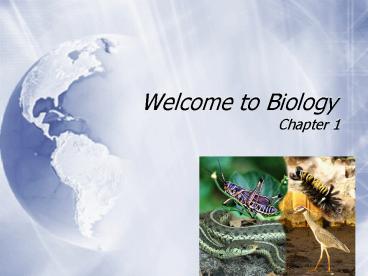Welcome to Biology - PowerPoint PPT Presentation
1 / 21
Title:
Welcome to Biology
Description:
Example: Jane Goodall's chimpanzee research. Fleming's discovery of Penicillium ... facts of nature. Example: gravity. Kinds of Research. Quantitative research ... – PowerPoint PPT presentation
Number of Views:25
Avg rating:3.0/5.0
Title: Welcome to Biology
1
Welcome to Biology
- Chapter 1
2
Introduction
- Biology is the study ___________
- Biologist study
- Interactions of the environment
- Study of interactions among species
- Study problems and propose solutions through
research
3
Characteristics of Living things
- Organisms is anything that possess all of the
characteristics of life - 1. Organization - all living things
___________________ - 2. Growth - increase in the amount of living
material and the formation of new structures
4
Continue
- 3. Reproduction - _________________
- Not necessary for survival of an individual
organism BUT is essential for continuation of the
organisms species - __________- group of organisms that can
interbreed and produce fertile offspring
5
Continue
- 4. Environment - adjust to the environment
- Organisms live in constant interaction w/ their
surroundings - __________ - condition in the environment that
requires an organism to adjust - __________ - reaction to a stimulus
- Homeostasis - regulation of organisms internal
environment
6
Continue
- 5. ___________ - any structure,behavior, or
internal process that enables an organism to
respond to stimuli and better survive - ___________ - gradual accumulation of adaptations
over time
7
Discovery Science
- Description of natural structures or processes
through careful observation and data collection - Example Jane Goodalls chimpanzee research
- Flemings discovery of Penicillium
8
Scientific Method
- Scientific method are steps used by scientist to
gather information and answer questions - Scientific method occurs in steps!
9
Steps to Scientific method
- Observation
- Question
- Hypothesis
- Experiment
- Results and Analysis
- Conclusion
- Communicate results
10
Observation
- use of the senses to gather and record
information about structures or processes in
nature
11
Inference
- Logical conclusion based on observations
- E.g Thinking someone is at the door when the
doorbell rings
12
Step 1
- Hypothesis - is an explanation for a question or
a problem that can be formally tested - Idea of answer to question through observation
- Make additional observations
- Accept or reject hypothesis NEVER _______
13
Step 2
- __________ - procedure that tests a hypothesis by
the process of collecting information under
controlled conditions - 2 groups ________ experimental
- __________- group which all conditions are kept
the same - _____________- test group where all conditions
are kept the same except a single condition
14
Independent v. Dependent
- ____________ - thing or event that is being
studied - ___________ - condition that results from changes
in the independent variable (what are you
measuring?) - Example Paper towel absorbency
- _________ - conditions that differs in experiment
15
Step 3
- Data - information obtained from experiments
- Numerical or verbal
- Analysis includes comparing results and
conclusions with works that are published
16
Step 4
- Results and conclusions are reported in
scientific journals - Peer reviews - scientist can repeat experiments
to verify results
17
Theories and Laws
- ________ explanation of natural phenomenon that
is supported by a large body of scientific
evidence from different observations and
experiments - Not absolute
- Revised
- E.g Idea that all living things are made
- of cells
- ________ facts of nature
- Example gravity
18
Kinds of Research
- Quantitative research
- Numerical data
- Graphs and tables
- Descriptive research
- Observational data (written descriptions)
- Models - physical, mental, or mathematical
representation of an idea or process
19
Measuring
- International System of Measurement (SI) - metric
system - Advantage few basic units decimal system
- Meter (length) Gram (mass) Liter (volume)
Second (time) Celsius (temperature)
20
Models
- Physical, mental, or mathematical
- Drawing
- Graph
- 3D object
- Computer program
21
Science and Society
- Ethics are the moral principles and values held
by humans - Technology is the application of scientific
research to societys needs and problems

